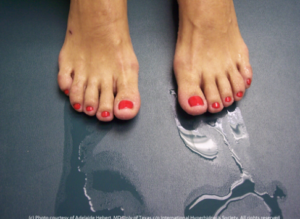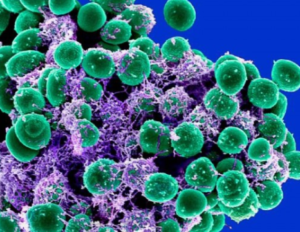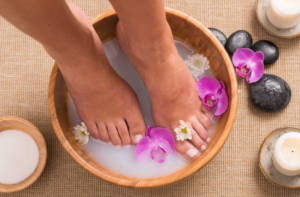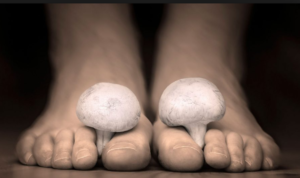10 Apr STINKY FEET
STINKY FEET
It’s embarrassing, it stings the nostrils! Bad foot odour can be conquered and here is how…..
https://www.sportspodiatry.com.au/services/
Why do feet stink?

The 2 main reasons are pretty obvious- Sweat & Poor Hygiene
Bacteria can thrive in the moist and hospitable environment of your shoe. They can stick around on your foot, snacking on skin oils and dead skin cells, and before long, they are having bacteria babies and you’ve got yourself a foot odour problem! Even bacteria need to go to the toilet after eating up all that delicious dead skin if they survive that long. They eliminate waste in the form of organic acids. That’s the reason even your clean feet can smell badly, yep, bacteria poo. Not all bacteria are equal…Kytococcus sedentarius has a particularly nasty rotten egg stench while staphylococcus epidermidis is responsible for anything cheese-like or musty smell. Yummo!

Let’s get sweaty…
Humans have over 250,000 sweat glands in their feet so don’t be embarrassed that your feet get sweaty! Turn up the heat and add exercise into the mix and the glands in your feet are working overtime trying to keep you cool. Everyone produces different amounts of sweat from different parts of their body. At different times in our lives, we can expect to be extra sweaty too. Sweat alone is not the bad guy, it is all the side effects we worry about. Slipping and sliding around in our shoes can form blisters. Bacteria and fungi can prosper in damp conditions. What a haven for infection! Here is a list of things that might make you sweaty:
- Stress and Anxiety: the perpetual state in which everyone finds themselves, starting the sweating, bacteria-growth cycle
- Hormones: Teenagers, pregnant ladies, pre-menopausal/menopausal women, sorry it’s a sweaty time for you.
- Genetics- thanks, Mum and Dad.
- Diet: of course, it is all of the good stuff like alcohol, coffee, garlic/onions, spicy food, and fizzy drinks that could be contributing. Don’t have too much of a good thing.
- Exercise: Goes without saying really. Heart rate rises sweat increases.
- Hyperhydrosis: Some unlucky people have a condition called Hyperhydrosis which according to the Mayo Clinic, “is abnormally excessive sweating that’s not necessarily related to heat or exercise.” Hyperhidrosis could be a side effect of certain medications or a symptom of more serious health conditions (i.e. diabetes, cancer, heart failure)

Shoes and socks:
Wearing the same shoes every day is a major cause of smelly feet. Wear a pair, sweat in them, and don’t bother to let them dry or wipe them out. You could notice an odor as early as the second time you wear them. Here are a few tips to stop your favourite trainers from becoming cesspools of bacteria:
How to keep feet bacteria-free:
-
- Wash your feet every day using antibacterial soap.
- Always keep your toenails clipped and clean.
- Dry your feet thoroughly after showering.
- As added insurance, wipe down your feet with an alcohol wipe to close up your pores and reduce sweating temporarily. Do this before you put on your socks and shoes for the day.
- Use a foot deodorant or antiperspirant. It is the same idea as getting rid of smelly (arm)pits. Antiperspirant works by plugging up your pores and blocking sweat. By blocking the sweat, it can also prevent bad foot odor. Clinical strength antiperspirants can be very effective in treating hand and foot sweating.
- Wear socks, wear the right socks, and change them daily! Avoid nylon socks and go for organic fibres like cotton, wool, and bamboo that wick the moisture away from the skin = dry, cool feet. There are socks out there with silver/copper-impregnated fibers that also boast antibacterial properties. We like bamboo.
- Before washing, turn socks inside out to shed dead skin flakes.
- Don’t wear the same pair of shoes two days in a row. Let them air and dry out in the sunshine. Wipe out your shoes, or use anti-bacterial powders and sprays. It’s time to remind any bacteria that have set up shop it’s time to leave.
- Choose leather and canvas shoes over synthetics or shoes with ventilation when it’s hot. Sandals and thongs are more popular in hot climates for a reason.
- As long as floors are clean, go around barefoot and let those feet breathe.

Other natural remedies to try in addition to these…
You are not the first person ever to have stinky feet! For centuries people have been using all sorts of remedies. Here is a sample of simple, cheap, natural treatments that you could try:
-
- Exfoliate Feet. Exfoliation is the process of removing dead skin cells from your body. Odor-causing bacteria love to feed on these dead skin cells. Use an exfoliating brush or glove on your feet 2-3 times a week to help keep bacteria away.
- Vinegar- apple cider or white vinegar will work. Vinegar is an amazing product to have at home. It’s a natural astringent (tightens skin and closes pores)— just like an antiperspirant. But it also keeps foot odor away with its antifungal and antibacterial properties. Use a cotton ball to apply or do a little foot soak for 15-20 mins. Mix 1-part apple cider vinegar, 1-part water, and ½-part baking soda in a large bowl or basin
- Baking soda or Corn starch: Sprinkle in your shoes. Use to absorb sweat and keep the feet dry like foot powders. Baking soda will even kill some bacteria to neutralise the odor.
- Lemon Juice: Use cotton balls to apply fresh lemon juice to the soles of your feet before putting on your shoes and socks. It helps to close your pores and prevent sweating. Lemon juice can also work as a natural deodorant.
- Tea Foot Soak: Soak your feet in tea for half an hour daily – for a week – letting the tannic acid work its magic. Just add 4 – 5 tea bags to a litre of boiling water. Once cooled, soak your feet for 15-20 minutes. Some report that drinking tea can also help combat foot sweat.
- Soak feet 20 minutes a day in ½-cup kosher salt per litre of water, don’t rinse, and dry thoroughly with a clean dry towel.
- Try 1 tablespoon baking soda per litre of water and soak for half an hour and 30 minutes as many times as you like.

What if that doesn’t work??
If you’ve tried the various antibacterial remedies to stop the stink and all have failed, it’s time to look elsewhere. Too often, the diagnosis is Athlete’s Foot or Tinea. The good news is that Athlete’s Foot isn’t a bacterial problem; it’s a fungus-based infection. Think mushrooms. Not actual mushrooms, but a fungus. This a super common condition that also invades skin that’s perpetually warm, moist, and irritated.
The tell-tale signs are easy to detect – burning, stinging, itching, redness, and flaking – especially between toes where moisture accumulates.
Athlete’s Foot is contagious so don’t share linens and whatever you do, don’t share shoes or socks. There are lots of over-the-counter remedies for this fungal infection, but if nothing works, head to a doctor or podiatrist because the infection is likely to slowly get worse leading to open lesions, oozing, and crusty blisters and it can spread to your nails.
Last resorts:
Iontophoresis Treatment
If antiperspirant doesn’t stop foot perspiration, Iontophoresis might be a good option. It’s been used for over 50 years to treat excessive sweating of the hands and feet. Iontophoresis works by using electrical currents to drive the medication into the skin’s surface. It’s similar to an injection, but without the needles. Iontophoresis machines can be purchased and used at home. (cost ranges from $400-650 AUS) There are skin clinics around the place that offer the service too.
Botox Injections (Botulinum Toxin)
Botox injections temporarily block the chemicals that activate the nerves that cause sweating. Affected areas of your feet will receive enough injections to ensure that all the nerves have been treated. The desired effects will last 3-4 months. The treatments must be repeated. Botox injections for plantar hyperhidrosis (excessive foot sweating) can be painful.
Thanks for stopping by and feel free to share this info with your friends
Talk soon,
Hannah
Podiatrist at Sports and Structural Podiatry
Contact us:
202/2 Emporio Place, Maroochydore Qld 4558
Ph: (07) 54791211 | Fax: (07) 54791227
www.sportspodiatry.com.au
Email: admin@sportspodiatry.com.au

Sorry, the comment form is closed at this time.